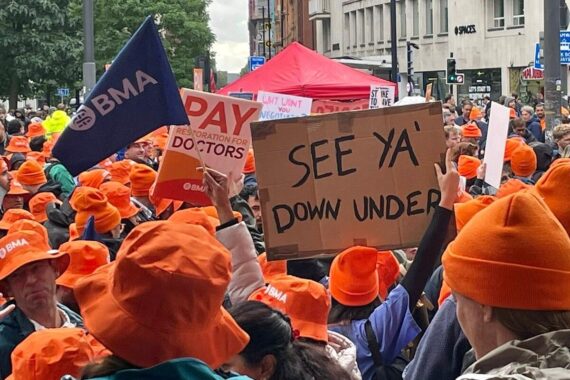Junior doctors to strike again after failed talks with new health secretary

Junior doctors have voted for further strike dates over the Christmas period and in the new year after rejecting the Government’s new pay offer.
This follows five weeks of ‘intense negotiations’ between the BMA’s junior doctors committee and the Department of Health and Social Care.
The Government has offered an additional 3%, on top of the average 8.8% increase already awarded this year.
But the committee co-chairs Dr Robert Laurenson and Dr Vivek Trivedi said this increase ‘would still amount to pay cuts for many doctors’.
Last month, former health secretary Steve Barclay was replaced by Victoria Atkins, and the BMA has said her approach has been ‘more constructive’.
The walkouts will take place for three days from 20 December and six days from 3 January – the January strike will be the longest of the industrial action so far.
Strikes have been put on hold over the last five weeks, but the BMA said the ‘deadline’ has now passed and the Government has been unable to put forward a ‘credible offer’ for junior doctors.
Dr Laurenson and Dr Trivedi said: ‘Without enough progress by the deadline, we have no choice but to take action that demonstrates doctors are as determined as ever in reversing their pay cuts.
‘However, we can still avoid the need for these strikes. We will be ready and willing any time the Government wants to talk. If a credible offer can be presented the day before, or even during any action, these strikes can be cancelled.’
Health secretary Ms Atkins said: ‘The new strikes will result in more disruption for patients and extra pressure on NHS services and staff as we enter a busy winter period, risking patient safety.’
The offer could also affect GPs, as it sees the Government committing to an overhaul of the workings of the Review Body on Doctors and Dentists Remuneration (DDRB).
In October, NHS formally warned the BMA over the ‘cumulative’ impact of doctor strikes which are causing ‘significant disruption and risk to patients’.
At the time, consultants and junior doctors were jointly striking for three full days.
Local GP leaders recently voted for an industrial action ballot of GPs to take place once the outcome of the contract negotiations is known.
GP Committee England chair Dr Katie Bramall-Stainer said the ‘strength of the profession’s negotiating position’ is going to be ‘highly dependent’ on the ‘willingness of GPs’ to take collective action.
In Northern Ireland, the BMA’s GP Committee will ‘fully explore’ whether industrial action is an option for GP partners following a vote at the recent LMC conference.
Related Articles
READERS' COMMENTS [6]
Please note, only GPs are permitted to add comments to articles










Good on you.
Stand strong and don’t give in.
This bunch of utter incompetents will soon be gone and you may have a half decent government to negotiate with
Keep fighting.
I’m proud of them all———-unfortunately, it’s the only way
Agree with David, Anon, and John… stay strong, don’t get the bastards win. We are with you all the way.
Not all gone to Australia after all?
Sadly this is the only way. The Barristers got 15% with hardly a fight. Shows how much they value doctors.